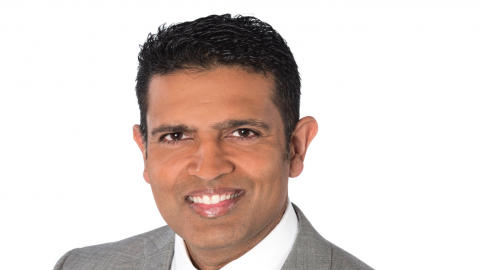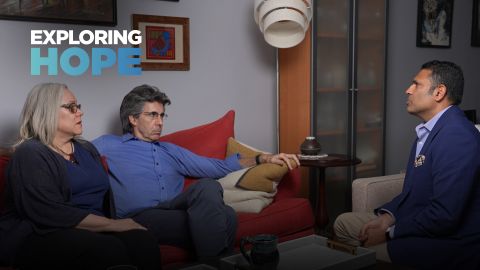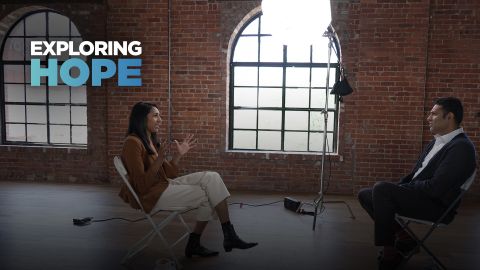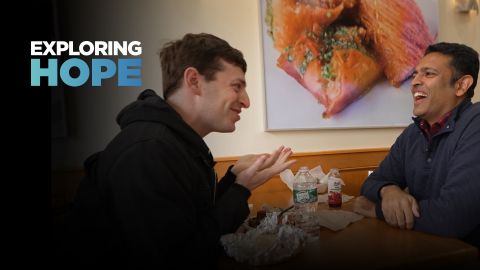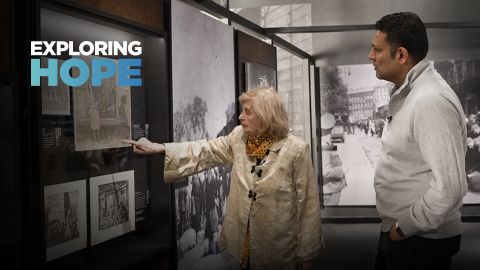Kristofer Goldsmith: This is Telegram using the web app.
Hari Sreenivasan: Kristopher Goldsmith is an Iraq war veteran and founder of Task Force Butler Institute.
Kristofer Goldsmith: Task Force Butler has built a system so that as we are viewing things on Telegram, it’s saving screenshots, and it’s basically scraping all of the data.
Hari Sreenivasan: Oh, wow…So you have different hate groups, basically, as channels. And there’s a lot of chatter on some of these.
Hari Sreenivasan: Taskforce Butler Institute is a non-profit with the mission: “We are American veterans who hunt neo-Nazis.”
Video: Task Force Butler believes in preserving our democratic institutions. As veterans, we are now in the fight to defend our democracy from fascist enemies right here at home.
Hari Sreenivasan: The volunteer organization collects information on white supremacists and other extremist group activities on the internet and in person. Goldsmith compiles reports and shares them with local and federal law enforcement.
Kristofer Goldsmith: The research that Task Force Butler does is ugly. We go into the ugliest places in America, online, in the real world. And we document that ugliness, especially when it creeps up, you know, from just detestable to criminality.
Hari Sreenivasan: Tell me a little bit about your military background.
Kristofer Goldsmith: So, I deployed to Iraq in 2005, was in the army, was in for about three and a half years, made it to the rank of sergeant. I came home with severe Post Traumatic Stress Disorder. So that led me into a life of advocacy. A few years ago, a friend of mine that I served with called me up and said, hey, Goldie, I joined a neo-Nazi organization, and I want you to help me take them down.
Kristofer Goldsmith: Now when he first said this to me, this phrase, neo-Nazi, I thought he was exaggerating, thought he was just talking about like some sort of far right group. It wasn’t until we were inside this hate group Patriot Front that I came to understand that they actually were doing things like reading Mein Kampf, that they were studying the history of the rise of fascism in Europe, and trying to apply that to what they were doing today in the United States. The core of their belief system was that they were self-described fascist that they wanted to see in their lifetimes, the United States become a white ethno-state.
Hari Sreenivasan: Are they able to target veterans specifically? And if so, how?
Kristofer Goldsmith: So January 6th created kind of this popular misconception that veterans were radicalized in the United States because in the days following the insurrection, a lot of veterans were among those getting arrested. Extremist organizations target veterans for the same reason that the Russians target them and that the Republican Party targets them. And fortune 500 companies target us, for recruitment. Because we are focused on the mission. We are team players, we understand how to train other individuals to do what we do. So, what Taskforce Butler does is when we get into their online spaces, whether it’s infiltrating a neo-Nazi organization. I’ll get vetted into a group like the Aryan Freedom Network.
Kristofer Goldsmith Video: I’m wearing a skull mask popular with neo-Nazis. Wearing my desert storm booney cap, that’s actually the one I served with…Hey, can you hear me?
Hari Sreenivasan: Goldsmith shared this video of him getting accepted into an online neo-Nazi group…
Kristofer Goldsmith: Hey, can you see me?
Hari Sreenivasan: They wrote to him quote “I just needed to make sure you were white … you’re vetted”.
Kristofer Goldsmith: I’ll pretend to be a Nazi after being in their spaces for so long, I can speak like one. I can convince them that I’m one of them. Right, I know the things to say, I lean on my military background, my veteran experience.
Hari Sreenivasan: Is there a connection between what they say and do online and kind of offline real-world violence?
Kristofer Goldsmith: So two of the groups that we’ve taken, the closest looks at, last year was Project Blacklisted where we did an analysis of Patriot Front. We identified dozens and dozens members of Patriot Front. The one that we’re currently working on right now is called Project Husky. That’s an analysis of the Nationalist Social Club, which is a New England neo-Nazi group. Those groups use the violence that they commit as recruiting material.
Kristofer Goldsmith: So we can go to the National Socialist Club, their Telegram, and we have something like probably 300 references in here for pieces of evidence. Almost all of that evidence comes from their propaganda channel. So they are posting their manifestos, they’re posting where they were, when they were there, pictures of themselves. When they start posting the same person in the same uniform over and over and over again, we can start to map everywhere that they’ve been in every hate crime that they’ve been involved in.
Kristofer Goldsmith: So they’re posting video here, you know the video of themselves in action. They’re showing their approach here towards the bookstore. They’re making a point to show the Black Lives Matter Sign.
Kristofer Goldsmith: Here they are knocking on the doors. And they’re holding up the Danzig, a Nazi flag. Technical difficulties, what’s that mean? A physical assault. Oh, look, they just physically assaulted someone on private property. They’re shouting their name and NSC 131.
Hari Sreenivasan: So they’re proud of this fact. They’ve turned it into a polished propaganda video for themselves, because they think this will help recruit more people, right?
Kristofer Goldsmith: Yeah.
Hari Sreenivasan: But in the process, they are turning over evidence of their crimes.
Kristofer Goldsmith: Well, and you know, to be fair to them, they’re right. Police don’t do anything about this. Law enforcement has not done anything about this. This was over a year ago, so this was on the evening of February 12, 2022. At least 10 members of NSC 131 attempted to break into a reading room at the Red Ink Community Library in Providence, Rhode Island.
Kristofer Goldsmith: And they assaulted at least one individual on private property. Why? Because they identify these folks as as communists. That is political violence. That is literally the federal definition of terrorism. And just in case a DA who’s reading this doesn’t think that there’s a law that defines terrorism. We include it in our report.
Hari Sreenivasan: You spell it out.
Hari Sreenivasan: Task Force Butler Institute has so far released the two reports which document 12 incidents in detail over the past two years. Goldsmith is hoping for law enforcement to bring charges but as of June 2023, none have been filed.
Hari Sreenivasan: Have you seen organizations like the Patriot Front, take extra measures to try to harden themselves knowing that people like Task Force Butler exist?
Kristofer Goldsmith: Yeah, the Aryan Freedom Network, for example, we flew a drone over their national conference last year. We know from being inside their channels that now they think Antifa has an Air Force.
Kristofer Goldsmith: So if I can keep the Aryan Freedom Network, looking up at the sky, anytime that they meet, because they think that I’ve got a drone over their head, that is a cost that I have imposed on them. It’s not just to get law enforcement to do its thing. It’s to impose those societal costs, those emotional, and psychological costs, we want to make it as difficult and as expensive as possible to be a neo-Nazi in this country.
Kristofer Goldsmith: I’m not speaking for everyone within my organization. But you know, I don’t have a lot to be proud of for my service in Iraq. I didn’t defend democracy. I didn’t defend Americans or Iraqis rights. But what I’m doing right now, often from my home office, is I am defending American values. And I am defending Americans’ lives and their rights to live the way that they want to live. And that is something I can be immensely proud of.

